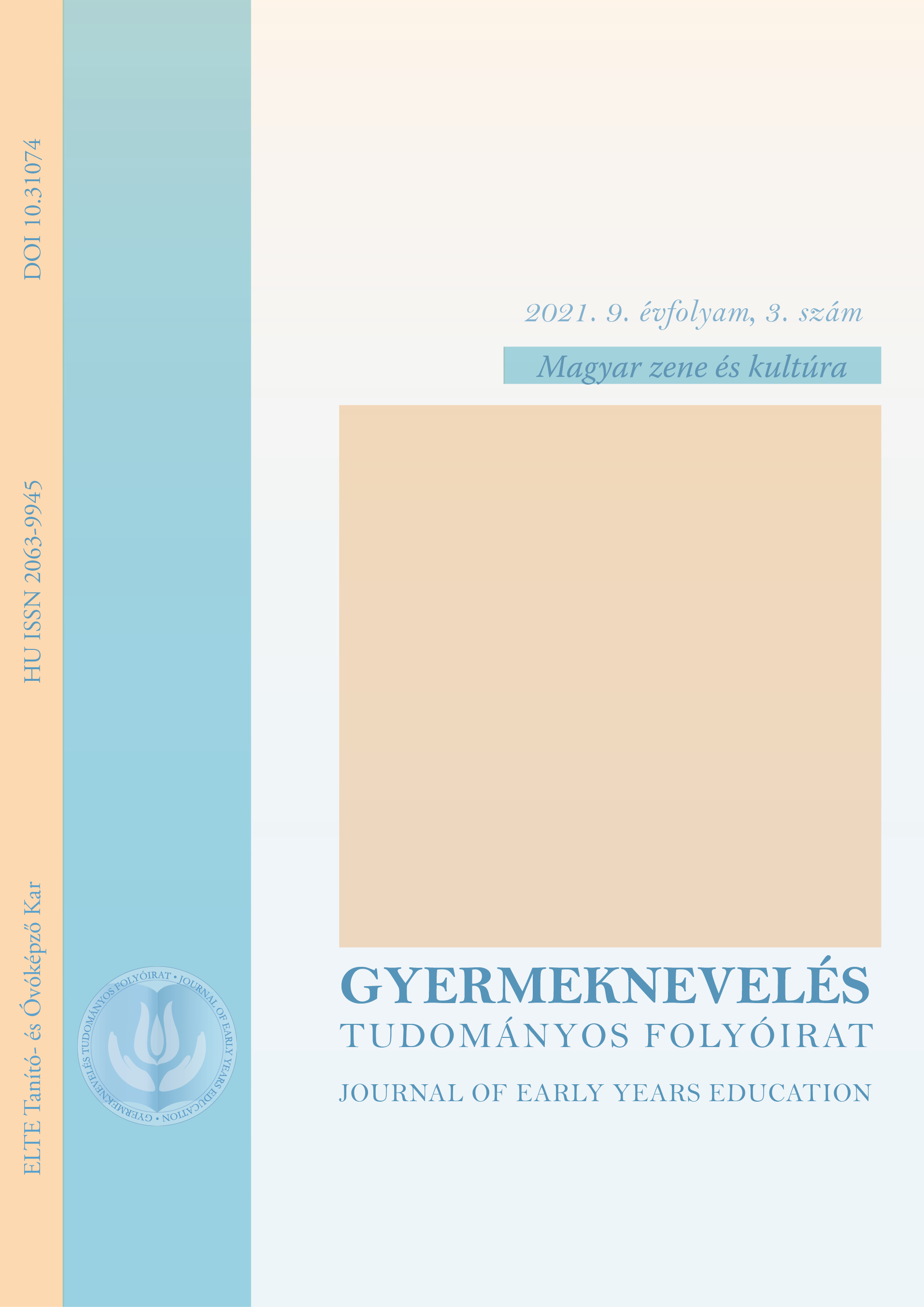Role of gamification in music education
DOI:
https://doi.org/10.31074/gyntf.2021.3.57.74Keywords:
art activity, attending an art event, art experience, cultural transferAbstract
In this study we examined the extracurricular art activities of fourth grade primary school students and their opportunity to participate in cultural and artistic events. We explored whether artistic activity has an effect on attitudes toward events. In addition, we sought differences in the family backgrounds of those who attend and do not attend extracurricular art events. The results, in addition to highlighting the role of the school in balancing out cultural capital, confirm the strength of the impact of intergenerational transfer. If the parents were previously been involved in artistic activities, they will also be more supportive of their child in the field of arts. Students who engaged in some form of extracurricular artistic activity in their childhood are more likely to become cultural consumers in adulthood.
Downloads
References
Bartle, R. (2004). Designing virtual worlds. New Riders.
Birch, H. JS & Woodruff, E. (2017). Technical exercise practice: Can piano students be motivated through gamification? Journal of Music, Technology & Education, 10(1), 31–50. https://doi.org/10.1386/jmte.10.1.31_1
Cambridge Dictionary. https://dictionary.cambridge.org/dictionary/english/gamification
Chrappán, M. (2017). A természettudományi tárgyak helyzete és elfogadottsága a közoktatásban. Magyar Tudomány, 178(11), 1352–1368. https://doi.org/10.1556/2065.178.2017.11.3
Christians, G. (2018). The Origins and Future of Gamification. University of South Carolina. https://scholarcommons.sc.edu/senior_theses/254/
Csíkos, Cs. (2012). Melyik a kedvenc tantárgyad? Tantárgyi attitűdök vizsgálata a nyíltvégű írásbeli kikérdezés módszerével. Iskolakultúra, 12(1), 3–13.
Fromann, R. & Damsa, A. (2016). A gamifikáció (játékosítás) motivációs eszköztára az oktatásban. Új Pedagógiai Szemle, 66(3–4), 76–81.
Fromann, R. (2017). Játékoslét. A gamifikáció világa. Typotex.
Gábris, Z. (2019). Gamifikáció az oktatásban - avagy hogyan motiváljuk tanulásra az Alfa és Z generációt? https://mindsetpszichologia.hu/gamifikacio-az-oktatasban-avagy-hogyan-motivaljuk-tanulasra-az-alfa-es-a-z-generaciot
Gomes, C., Figueiredo, M. & Bidarra, J. (2014). Gamification in teaching music: Case study. In EduRe 14 proceedings . International Virtual Conference on Education, Social and Technological Sciences (pp. 1–19) . Valência: Universidade Politécnica de Valência http://hdl.handle.net/10400.2/3478
Gomes, J., Figueiredo, M. & Amante, L. (2014). Musical Journey: A virtual world gamification experience for music learning. International Journal on Advances in Education Research, 1(1), 1–21.
Jakobicz, D., Wamzer, G. & Józsa, K. (2018). Motiválás az ének-zene órákon. Gyermeknevelés Tudományos Folyóirat, 6(2), 18–31. https://doi.org/10.31074/gyn201821831
Janurik, M. & Józsa, K. (2018): Az iskolai zenetanulás iránti motivációt alakító néhány tényező. Gyermeknevelés Tudományos Folyóirat, 6(2), 5–17. https://doi.org/10.31074/gyn20182517
Janurik, M., Kis N., Szabó N. & Józsa K. (2021). Az ének-zene tantárgy iránti attitűd összefüggése az iskolai zenetanulás iránti motivációval hetedik osztályos tanulók körében. Neveléstudomány: Oktatás–Kutatás–Innováció, 3(2), 17–42. https://doi.org/10.21549/NTNY.33.2021.2.2
Janurik, M., Szabó, N. & Józsa, K. (2020). A zenei énkép jellemzői és összefüggése a zenei képességekkel hetedik osztályosok körében. Magyar Pedagógia, 120(2), 171–200. https://doi.org/10.17670/MPed.2020.2.171
Józsa, K. (2000). Az elsajátítási motiváció szerepe a kritériumorientált pedagógiában. Új Pedagógiai Szemle, 50(10), 78–82.
Koivisto, J. & Hamari, J. (2019). The rise of motivational information systems: A review of gamification research. International Journal of Information Management, 45, 191–210. https://doi.org/10.1016/j.ijinfomgt.2018.10.013
Kusuma, G. P., Wigati, E. K., Utomo, Y. & Suryapranata, L. K. P. (2018). Analysis of Gamification Models in Education Using MDA Framework. Procedia Computer Science, 135, 385–392. https://dx.doi.org/10.1016/j.procs.2018.08.187
Malone, T. W. (1981). Toward a theory of intrinsically motivating instruction. Cognitive Science, 5(4), 333–369. https://doi.org/10.1207/s15516709cog0504_2
Marczewski, A. (2014). Defining gamification – what do people really think? https://www.gamified.uk/2014/04/16/defining-gamification-people-really-think
Pelling, N. (2011). The (short) prehistory of “gamification”... https://nanodome.wordpress.com/2011/08/09/the-short-prehistory-of-gamification/
Pintér, T. K. (2018). A zenei nevelés megítélése általános iskolás tanulók körében. In Váradi, J. & Szűcs, T. (Eds.), A zenepedagógia múltja, jelene és jövője (pp. 205–219). Debreceni Egyetemi Kiadó. https://doi.org/10.31074/gyntf.2020.2.74.109
Pintér, T. K. (2020). A zeneoktatásunk kihívásai és nehézségei általános iskolai és gimnáziumi énektanárok nézetei alapján. Gyermeknevelés Tudományos Folyóirat, 8(2), 74–109. https://doi.org/10.14232/ISKKULT.2020.7.3
Pintér, T. K. & Csíkos, Cs. (2020). Tanulók, szülők és tanárok perspektívái az iskolai zenei nevelés céljáról és feladatáról. Iskolakultúra, 30(7), 3–25.
Polonyi T., & Abari K. (2017). A gamifikáció motivációs eszközei a nyelvoktatásban. http://inyelv.unideb.hu/files/btan/a_gamifikacio.pdf
Prievara, T. (2015). A 21. századi tanár. Neteducatio Kft.
Szabó, N. (2018). Zenesziget. Játékosítás (gamifikáció) digitális eszközökkel az ének-zene oktatásban. Gyermeknevelés Tudományos Folyóirat, 6(2), 97–107. https://doi.org/10.31074/gyn2018297107
Szabó, N., Janurik, M. & Józsa, K. (2019). The effect of Music Island (computer program) on the development of musical abilities in school Music lessons. In L. Gómez Chova, A. López Martínez, & I. Candel Torres (Eds.), EDULEARN19 Proceedings: 11th International Conference on Education and New Learning Technologies (pp. 589–599). IATED. https://doi.org/10.21125/edulearn.2019.0212
Downloads
Published
How to Cite
Issue
Section
License
Copyright (c) 2021 Author

This work is licensed under a Creative Commons Attribution-NonCommercial-ShareAlike 4.0 International License.

